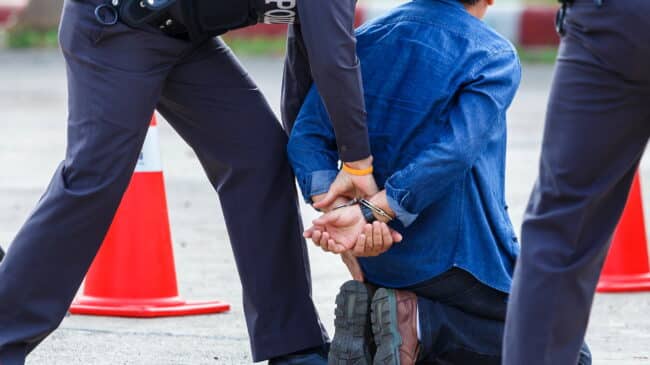For those living with mental illness, interactions with law enforcement too often end in tragedy. According to The Washington Post, in 2020 approximately 1,000 people were shot and killed by police officers. Of those, more than 1 in 4 showed signs of mental illness.
Municipalities across the country are addressing this problem by experimenting with alternative approaches to dealing with mental health crises and 911 calls. Many reform efforts are promising, but some of their efficacy may be hampered by poor implementation, lack of resources, or budgetary constraints. Telehealth can alleviate some of these challenges and should be considered a tool to help bridge the divide between law enforcement and mental health services.
Telehealth enables law enforcement to connect with health care professionals remotely via telecommunications and digital communication technologies. Police officers generally lack the training and resources to respond appropriately to emergency calls involving individuals with mental illness. Consequently, individuals with untreated mental illness are 16 times more likely to be killed during a police encounter than those without mental illness according to data from the Treatment Advocacy Center. Even when interactions are not fatal, they can result in unnecessary physical trauma, arrest, and incarceration.
Many situations involving mental illness would be better addressed through health care rather than criminal punishment. Non-violent incidents related to public decency or disorderly conduct, for example, may not warrant a response from law enforcement. However, police officers are often the first to respond to these types of calls. Under those circumstances, officers have generally faced a decision between three options:
- Do nothing, leaving the individual in crisis and the public unserved;
- Make an arrest, perpetuating the alarming rate of incarceration among those with mental illness; or
- Initiate an involuntary psychiatric hold, subjecting the individual to a period of involuntary confinement in a treatment facility
Overreliance on law enforcement in these situations places undue demands on police officers and diverts limited resources away from more serious criminal concerns. Substituting or augmenting law enforcement in response to individuals experiencing mental health crises can alleviate some of this burden.
Several municipalities have deployed specialized teams to handle mental-health-related emergency calls. Specific approaches vary, but in general, these teams may consist of specially trained police officers, health care professionals, or both. Evidence on the impact of these reforms is somewhat mixed but suggests they can be successful when implemented well.
However, it is not always feasible for local governments to implement these sorts of programs. It may be difficult to determine the appropriate response before an officer is on the scene. Moreover, uncertainty about the nature of certain situations could raise legitimate safety concerns for unarmed personnel. Rural and financially stressed communities may also lack the financial or workforce resources necessary to employ or contract with health care and social work professionals.
An innovative approach using telehealth to connect police officers with mental health services could alleviate some of these barriers to reform. Pilot programs have been initiated in multiple states including Texas, Florida, and South Dakota. Typically, the programs equip officers with tablets that can be used to contact mental health professionals via audio and video. The technology enables mental health professionals to interact directly with individuals experiencing mental distress. Mental health professionals may also aid officers by providing guidance and identifying available resources.
In 2017, the Harris County Sheriff’s Office launched the Clinician and Officer Remote Evaluation (CORE) Pilot Program. An analysis of the CORE program in 2019 conducted by the University of Houston—Downtown showed promising results. When surveyed, 86 percent of officers answered that the clinician/psychiatrist helped safely de-escalate the individual in distress. Ninety-three percent said the clinician/psychiatrist helped them decide what course of action to take.
The CORE program has also been effective at avoiding transportation to emergency rooms and criminal detention facilities. Approximately 42 percent of CORE calls in 2019 were resolved on scene. Officers indicated that, in the absence of CORE, these calls would have likely resulted in transportation to an emergency room. Only two calls resulted in transportation to a jail or detention center.
More recently, police departments in Florida and South Dakota have adopted similar programs. In Florida, the Largo and Belleair police departments have adopted the Telehealth Remote Access to Crisis Evaluation (TRACE) program. Since November 2020, the number of involuntary psychiatric holds initiated by the Largo Police Department has decreased by 50 percent. Similarly, twenty-three counties in South Dakota began the Virtual Crisis Care pilot program in July 2020.
If telehealth programs continue to produce such promising results, other municipalities should consider implementing similar approaches. While in-person models may prove to be more effective, telehealth could nonetheless be another tool to address mental-health-related interactions with police. Given the complexity of the problem, policymakers should ultimately seek to provide law enforcement and mental health professionals with as many options as is practicable.
Of course, these types of policing reforms are only part of rethinking the punitive treatment of mental illness in the United States. Additional measures are required to provide treatment before mental health issues reach the point of crisis.

